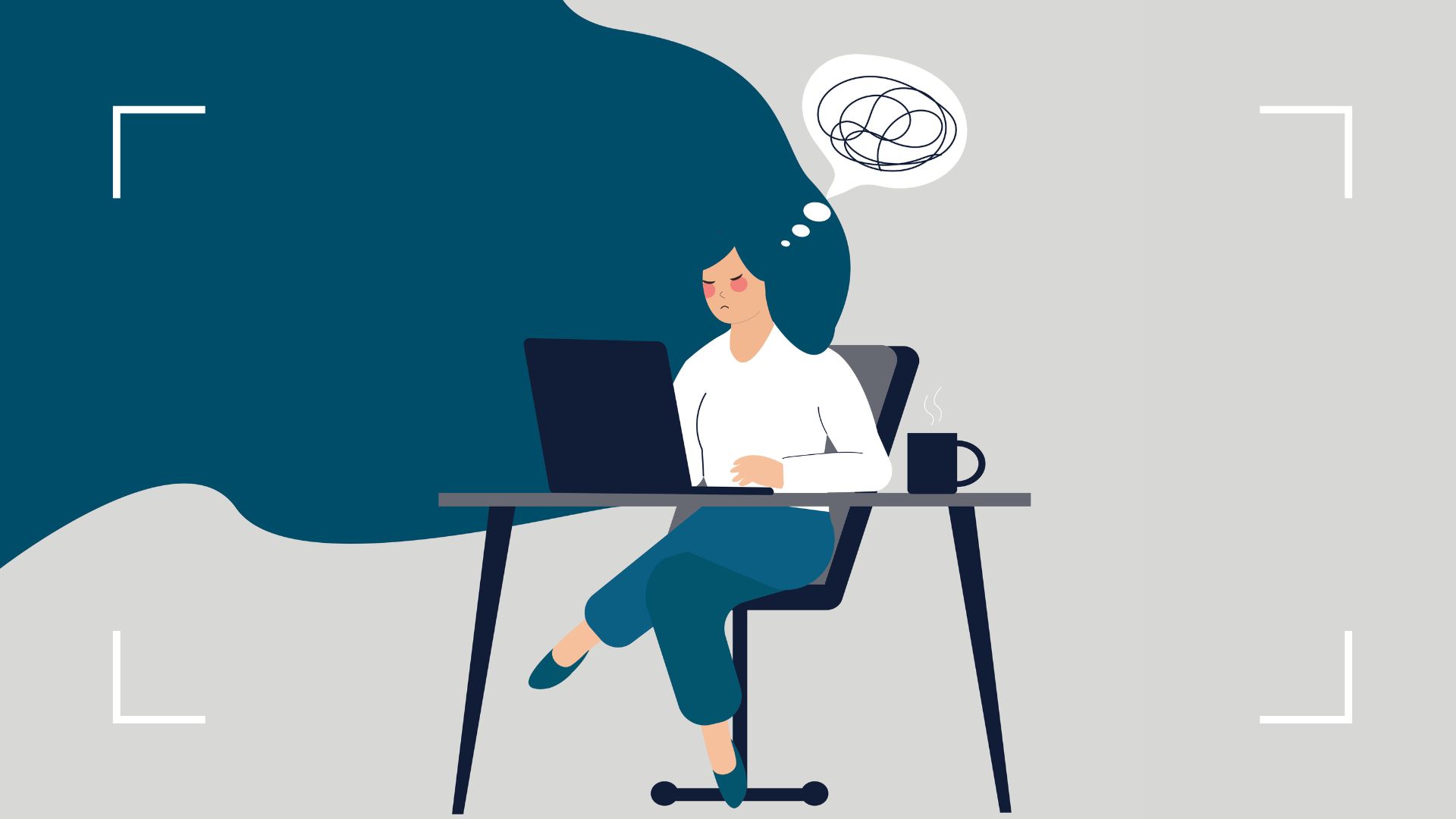How to recover from burnout: 5 ways to overcome work exhaustion and reset
Learning how to recover from burnout can help you get back back on track. Here, the experts explain how


You'll need to know how to recover from burnout if you're feeling overwhelmed at work to the point of exhaustion. Defined as a form of chronic stress by the World Health Organisation (WHO) in 2019, burnout is an issue more people are facing every day.
We're increasingly learning how damaging stress can be to our physical and mental health. Countless among us live with the ravages of contemporary life as many struggle to switch off in this connected age - it appears as though the fine line between living to work and working to live is blurred.
So, whether you have an inkling something isn't right, you find yourself slipping, or you're in the belly of the beast, you can learn how to lower cortisol levels and relax your mind. Here's everything you need to know about how to recover from burnout, with advice from the experts.
What is burnout?
Burnout from work is a state of mental, emotional, and physical exhaustion as a result of repetitive or long-term stress. "It's when the toll of the demands of our job or our life is greater than our ability to cope with those demands," explains neuroscientist and change specialist, Dr Lynda Shaw.
"When the demands are too high for too long, we feel a sense of hopelessness because no matter how much we do, it’s not enough, so we feel we have little control."
Kirat Randhawa, a New York City-based meditation instructor, agrees and emphasises that burnout is as much about a lack of resources to deal with the stress as the burden of the stressors themselves. "From my perspective, burnout is the experience of feeling cognitively, emotionally, and physically under-resourced for a sustained period of time," she says.
Although burnout is most often associated with professional life, this type of exhaustion can also manifest from other parts of our lives, with relationship burnout being another common issue due to the pressures of caretaking, parenting, romantic partnerships, and friendships. It's why learning how to recover from burnout is so essential, as its impact is so wide reaching.
Sign up for the woman&home newsletter
Sign up to our free daily email for the latest royal and entertainment news, interesting opinion, expert advice on styling and beauty trends, and no-nonsense guides to the health and wellness questions you want answered.

What are the symptoms of burnout
It's easy to confuse stress vs burnout, so per the NHS, these are key signs and symptoms that may suggest that you or someone you know may be suffering from burnout.
- Feeling overwhelmed
- Having racing thoughts or difficulty concentrating
- Being irritable
- Feeling constantly worried, anxious or scared
- Feeling a lack of self-confidence
- Having trouble sleeping or feel tired all the time
- Avoiding things or people you are having problems with
- Eating more or less than usual
- Drinking or smoking more than usual
The good news is, research has shown that these negative effects can be reversed and it is possible to learn how to recover from burnout, and even avoid burnout without quitting your job.
As a 2020 study of 1,136 employed US adults, titled Burnout Nation, from Springfield Health found, 76% are currently experiencing worker burnout. However, of these, more than half said that basic self-care practices like establishing a better bedtime routine and following a healthy diet would help them feel less burnt out. A further 40% said that talking to friends and family about how they were feeling would help and another 27% admitted that limiting their exposure to social media would be beneficial.
How to recover from burnout
1. Slow down and take some you time
"Burnout and habitual burnout are both extremely serious, so self-care needs to be high on the list," says Dr Shaw, who says slowing down, if you have the luxury to be able to, should be your first port of call.
When looking at how to recover from burnout effectively, Randhawa agrees and explains why it can be really helpful to slow down your daily life for a while. "I know that sounds counterintuitive but slowing down allows us to see things more clearly and thus move more effectively," she says. "Without this clarity and stability of mind, we end up taking longer to do the same task."
This may mean canceling plans and spending the time nurturing your closer connections with friends and family, or learning how to be happy alone sometimes. As research from Purdue University suggests, focusing on your physical self-care by catching up on medical appointments and doing more exercise can also help. It may also mean doing nothing at all or just taking a gentle walk, especially if you're suffering with exercise burnout. This space, time, and opportunity to consider your situation paves the way for the next step.

2. Identify the stressors
"I think one reason burnout may be on the rise is because of the increased access to responsibilities and stressors, where individuals are connected to these demands all day, every day, therefore making it difficult to ‘turn off’ properly," says Randhawa.
She flags potential causes, like the removal of the boundary between work, home, and school for people across the globe due to the pandemic. "Rather than having specific roles in specific environments, all responsibilities have merged into one setting where it feels as though it’s impossible to get everything done."
Once you get to the root cause of these stressors, you can consider if you're able to take them away by doing something different like separating work and home by working from an office, or if that's not convenient, at least outside the primary living space. If this isn’t possible, learning some stress management techniques will help.
3. Practice stress management techniques
Holistic methods, including breathing techniques for anxiety, have a proven positive effect on our mental health.
This alongside incorporating other elements of a more holistic life, like yoga for beginners or at least some form of daily meditative exercise, can go a long way to helping you learn how to recover from burnout sustainably.
"Mindfulness meditation can help with slowing down," says meditation instructor Randhawa. "This is where you sit in silence for some time simply observing a fixed point, usually the breath."
She continues, "Informal mindfulness practices, where we bring this same level of embodied awareness to everyday tasks, can also be helpful to stabilize the mind. These include activities like washing the dishes, doing laundry, making a cup of tea, and walking the dog."
3. Seek professional help
"Recovery is all about putting your health first," says Dr Shaw. "This is something many find difficult but without our health, we can’t contribute to our workplace, our families, and our friends."
Seeking professional help is, for many, a difficult step to take and if you're looking for how to help someone with burnout, it's a step that they may need a little extra help with. However, once you find a therapist and get on your journey towards improving your mental health, you'll be able to work on living a happier life.

4. Rest
One of the brutal impacts of burnout is how it can affect one of the most important human bodily functions: sleep. The odds are that if you're experiencing burnout, sleep disruption and sleep anxiety are also potentially huge issues that you face.
By focusing on getting into a good routine and practicing better sleep hygiene, you'll feel more refreshed in the morning and better equipped to face the day. By taking time off and teaching yourself how to sleep better more generally, you'll give your brain the chance to heal itself, a study by Medical University of Lublin explains.
The study looked at much of the evidence on the effect of sleep deprivation on the brain and found that overall, sleep imrpvoed memory recall, helped to regulate metabolism, and naturally, reduced mental fatigue. Importantly as well, they concluded that seven hours of sleep per night was necessary to achieve these cognitive and behavioral changes.
5. Remember times you felt motivated
Dr Shaw suggests sitting down and remembering the day you were excited to get your current job. "Do you remember how you felt and why you felt it? Getting back in touch with these thoughts and feelings may renew your enthusiasm, even just a little," she says.
Although the road to recovery may be long, and seem like a terrifying mountain to climb, by allowing yourself the space and time you'll be able to stop worrying about surviving, and get back to thriving.
How does burnout affect your brain?
Research from Jagiellonian University, among other institutions, has shown that there are several changes in the brain that occur when someone is experiencing burnout, explains Dr Shaw. "For instance, the frontal cortex is negatively affected, and this area is involved in those higher cognitive functions such as judgement, problem-solving, decision making, thinking, and so on."
The amygdala is also larger, the caudate shows signs of shrinkage, and grey matter is reduced. As the amygdala is the region of the brain primarily associated with emotional processes, the caudate helps control memory, reward, and motivation, and grey matter serves to process information in the brain, so the impact of burnout can be devastating. "This means that we have problems with attention, memory, and emotions," says Dr. Shaw. "Plus our neuroendocrine system and stress responses are disrupted."

Aoife is an Irish journalist and writer with a background in creative writing, comedy, and TV production.
Formerly woman&home's junior news editor and a contributing writer at Bustle, her words can be found in the Metro, Huffpost, Delicious, Imperica and EVOKE.
Her poetry features in the Queer Life, Queer Love anthology.
Outside of work you might bump into her at a garden center, charity shop, yoga studio, lifting heavy weights, or (most likely) supping/eating some sort of delicious drink/meal.
-
 Styling leopard elegantly can be tricky but Eva Mendes' classic black tailoring and stiletto boots made it look easy
Styling leopard elegantly can be tricky but Eva Mendes' classic black tailoring and stiletto boots made it look easyIf you struggle with knowing how to style daring leopard print pieces, making note of Eva Mendes' satin midi skirt look will be worth your time.
By Caitlin Elliott Published
-
 Lynsey Crombie reveals the surprising laundry mistake leaving your clothes smelling 'stale and nasty'
Lynsey Crombie reveals the surprising laundry mistake leaving your clothes smelling 'stale and nasty'Do your clothes smell unpleasant even after you've washed them? It could be your fabric conditioner
By Emily Smith Published